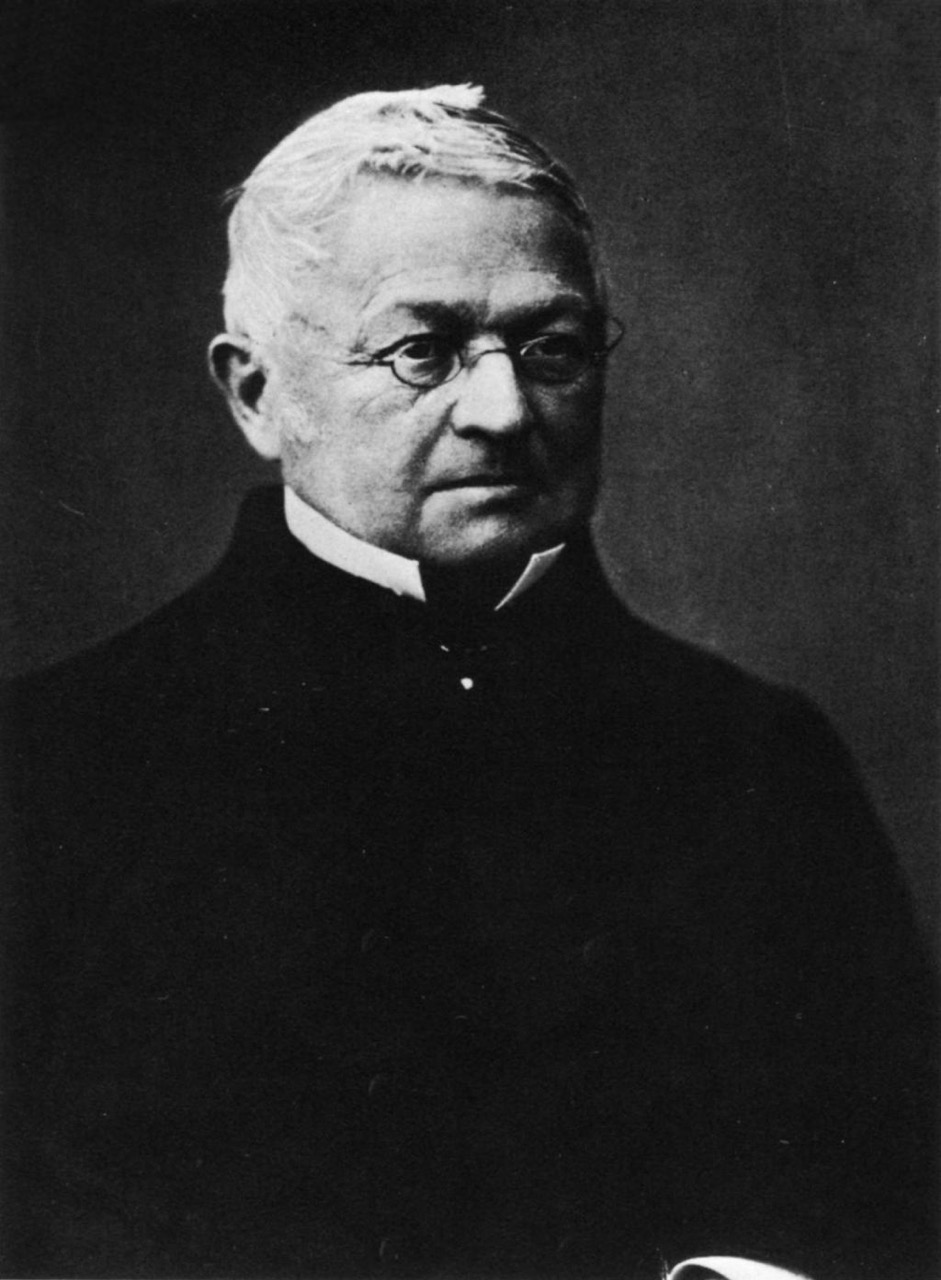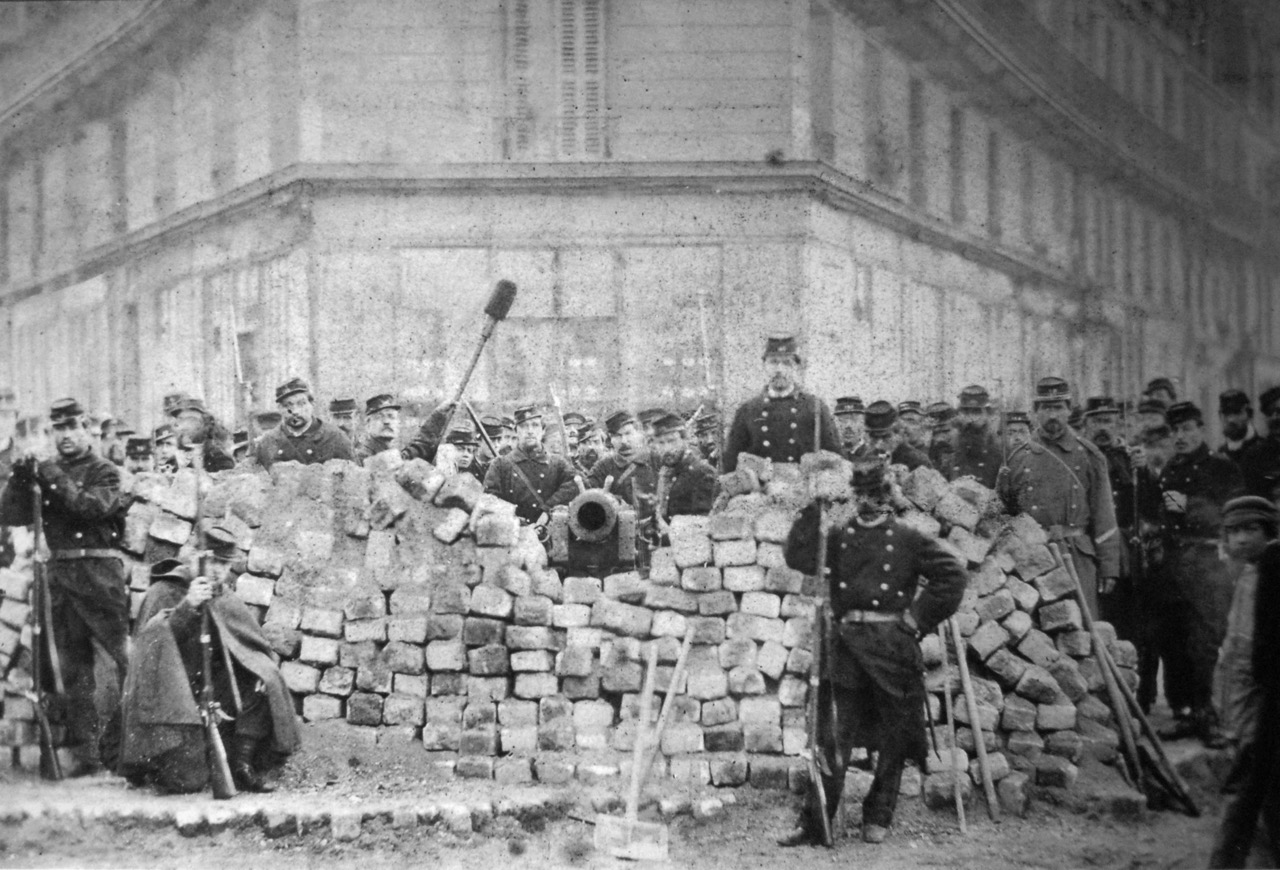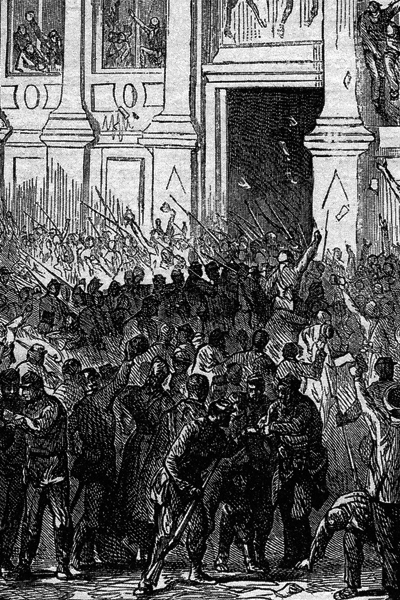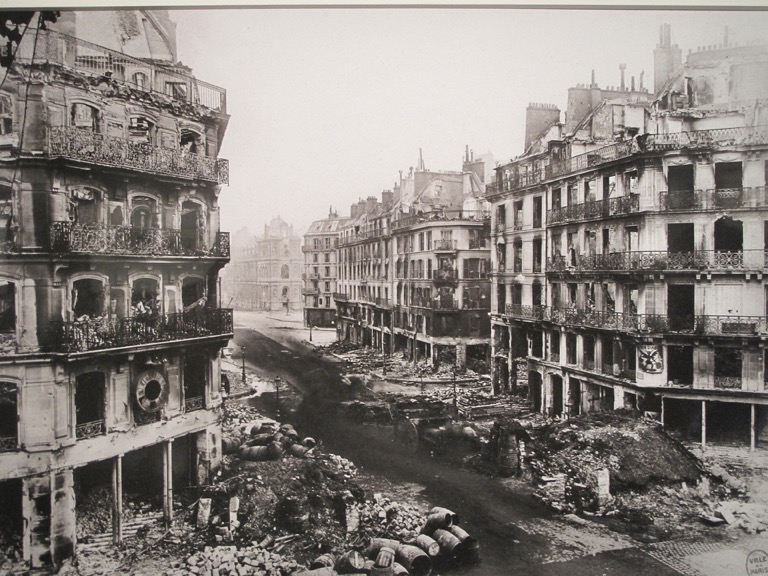For four months in 1871, angry citizens of Paris seized control of the city after a humiliating defeat against the Prussian Empire and the collapse of the Second Empire. The radical and revolutionary government and its brutal suppression was the inspiration for Karl Marx’s “dictatorship of the proletariat.” Although the experimental regime met a violent end, it has become part of the French national narrative. John Merriman, Charles Seymour Professor of History at Yale, has just published a book about the Paris Commune that takes a new look at how a radical government managed to find support from rich and poor, conservative and liberal, to try to regain dignity in the face of France’s brutal defeat.
Guests
 John MerrimanCharles Seymour Professor of History at Yale University
John MerrimanCharles Seymour Professor of History at Yale University
Hosts
 Joan NeubergerProfessor of History, University of Texas at Austin
Joan NeubergerProfessor of History, University of Texas at Austin
John Merriman has just published a new book on the last of the great revolutions that occurred in France, the Paris Commune of 1871. The book is called Massacre: the Life and Death of the Paris Commune.
So, John, this very short-lived revolutionary experiment was actually very complicated. On the one hand it was called the Festival of the Oppressed. It was the largest urban uprising in Europe in the nineteenth century, but then very quickly it ended in a horrific massacre. So let’s start with a short overview of what the Paris Commune was and then we’ll turn to talk about causes and results.
Sure. Well, the Paris Commune began on March 18, 1871 when very ordinary people, above all women, in Montmartre, on the edge of Paris—it had just been annexed into Paris in 1860—when they suddenly saw that troops were coming from Versailles to take the cannons of the National Guard, who had defended Paris against the Prussian siege that took place during the Franco-Prussian war. And they alerted the menfolk, who were still asleep and with men, women, and children, they stopped the troops from taking the cannons down the hill from Montmartre. They also discovered two generals who were infamous for their oppression of ordinary people and put them up against the wall (for better or for worse) and gunned them down. At that point, the head of the provisional government, a guy called Adolphe Thiers, withdrew the troops of the Versailles provisional government out of Paris and encircled Paris and prepared to crush the Commune.
The Commune de Paris lasted from March 18, 1871 until May 28th of the same year, 1871, when it was crushed in a blood bath by the troops of Versailles. But it was during this period that two important things happened: one is that ordinary people put forth their claims for a more just world, for the right for Paris to have a mayor, to have better wages, for women to have better conditions of life, etc. It was a time of big dreams. The second thing that happened, the most important thing that in a way anticipated many of the demons of the twentieth century, when you could be killed for simply being who you were. Bloody week lasted—and it was indeed that—from the 21st of May to the 28th of May, when the Commune came to a bloody and brutal end.
Well, let’s talk about the causes then. They have to be seen both in the internal domestic politics of France but also in international politics. Let’s start with the Franco-Prussian war. Tell us how that contributed.
The emperor of France was the nephew of Napoleon I and he was called Napoleon III and he managed, for a variety of improbable reasons, to get France in a war with Prussia and its German allies. And, to say the least, the war went badly. They are blown out almost everywhere, the French army is, by superior troops with superior cannons (above all) and Paris is surrounded. It is besieged really from the beginning of September until late January 1871. There were lots of coffins carrying old people and very young children and babies, a time of great hardship. Parisians wanted to continue the fight, hoping against hope that some kind of foreign intervention would arrive or that Lyon and Marseilles and other places might send troops to end the siege.
But they finally are defeated and France is forced to sign an armistice in which France lost all of Alsace, which was largely German-speaking I might add, and much of Lorraine, which became part of the new German empire, which was proclaimed oddly enough in the palace’s Hall of Mirrors in the Chateau of Versailles. And it was the provisional government that signed this armistice with Prussia and subsequently with the German Empire. And when elections returned very conservative, monarchically inclined deputies to create the new France in the legislature, that led to the event when the army of Thiers went up to Montmartre and other places (Belleville as well) to try and take the cannons. And the Paris Commune is proclaimed at Hôtel de Ville several days after the events of the 18th of March.
So the war was experienced very differently in Paris than in the rest of France?
Yes, there was fighting in the Loire, there was an army of the Loire, but basically the fighting was in the east. Napoleon III himself was captured at Sedan in the Ardennes, right near the Belgian border, thus well northeast of Paris, but it was the Parisians who suffered the most, as Paris was to be starved out by the German and Prussian armies and their allies.

So what brought about the end then? Was it the war that brought about the end of the Second Empire of Napoleon III? And what brought Adolphe Thiers to power?
Yes the war. And well, he became elected the provisional president of the fledgling regime in Bordeaux.
And was that a republic?
Well, that was the end of the Republic. That was it. A lot of Parisians thought they were going to install a monarchy or, at best, a very, very conservative and clerically inclined Republic led by Thiers. So there was a lot of tension there. And it was Thiers who referred to ordinary people as the vile multitude, so there were tensions there. And by the end of the Second Empire there had been a really important movement of workers debating politics, having the right to discuss finally the political world in the hangars, in the sort of warehouses on the periphery in Paris. And there was a republican/socialist movement, but the war, Napoleon III brought the fall and collapse of the Third Empire upon himself with this improbable war against Prussia.

So let’s go back to Paris then. Was the Commune workers against elites? Was it class politics or was it Paris against the rest of France or is it both?
Well, it was both. The classic Marxist interpretation says these are sort of proto-proletarians. Some of them were proletarians, but most of them were artisans and when life was good they could get by, but they had a lot of middle-class support too. A lot of middle class intellectuals were involved in this. There were parts of France: there were cities like Saint-Antoine and Lyon and Marseille that were extremely leaning towards supporting the Commune. But you had a lot of conservative France, particularly in the West of France, where people were against the Commune and had always resented Paris and didn’t necessarily speak French. And, in fact, the army that crushed the Communards, that slaughtered men but also women and some children during the bloody week of 1871, were Breton, they were from Brittany and many didn’t speak French at all. And many were from Normandy and other conservative districts in the north of France. So a class analysis won’t completely do, nor will just a Paris vs. the provinces interpretation work.
You know it was a complex time, but it was also a time of dreams and of hope and that’s what made me want to write this book about it. I picked a number of people on both sides whose lives I wanted to follow and, sadly for many of them, whose deaths I was able to recount. It is a lot of fun to research and a lot of ups and downs in writing about this. Someone could be killed for simply existing. It makes me think of—to use popular example (I probably shouldn’t do this)—you could be killed for simply existing. Forty-one shots, hands up, don’t shoot. You could be killed if you were Polish, you could be killed if you spoke Russian, you could be killed if had a working class accent, if you spoke with what we call in French an accent faubourien, if you spoke from the edge, from the margins of city life. If you had rough hands, it was a world of work; you were identified with being a worker and it would be up against the wall with you, if you were from certain parts of Paris.
The Catholic Church was a long time adversary of democratic-leaning forces in France. What role did the Church play in the tensions of 1871?
Well, that’s a complicated story. The archbishop who was executed as a hostage on May 24th by the Communards was a Gallican, in that he was against the pope and against the doctrine of papal infallibility and had been more or less against the doctrine of Immaculate Conception. But the Church was identified with the fancy folk of Paris and they had their weddings and their baptisms and their funerals in La Madeleine among other churches in the west. Remember the western part of Paris was more prosperous, more wealthy than the eastern proletarian quartier populaire districts. And there had been a rapid increase in the number of priests and nuns in the religious congregations that were resented by ordinary people. The Catholic Church had a monopoly over the education of girls and young women, which lagged behind that of men.
So from the point of view of ordinary people in Paris, the Catholic Church was allied with the Second Empire, which indeed it had been. And they entered into an adversarial relationship with the Catholic Church during the Paris Commune. But it’s more complicated than that. In some cases you had national guardsmen fighting inside the Commune, coming in to meet in clubs, which after all meant in churches, like Saint-Eustache, which were the biggest places you could meet, and suddenly coming across some priest who had given them their first communion. So it’s complicated, but essentially that was the role of the Church as it was perceived by working people, and particularly women who wanted the right to divorce, etc.
Did the Paris Commune accomplish any of its revolutionary goals?
Well they didn’t have much time. They did a few things, the most famous, of course, is they abolished night baking. You had all these bakers trying to heat up croissants for all the wealthy people—and not just the wealthy people. But they did some progressive things. They set up nurseries for working women. They made sure that unionized women were making and repairing the uniforms of the national guard. But the guns of the enemy were drawing closer and closer and they were shelling Paris almost from the beginning of the whole thing, from the beginning of April. And it’s amazing. They disputed, they didn’t all have the same ideology, there were some who were Jacobin, who were radical centralizers, there were some socialists, there was a smattering of anarchists, you had some moderate republicans who only wanted the right to vote, that Paris should have a mayor for whom they would vote. And it’s amazing what they did accomplish in such a short period of time.

So why then did it end so quickly and in such a bloodbath?
It ended in a bloodbath because that was what Theirs was planning to do. When he pulled soldiers out of Paris, he wants to build up his army to 130,000 men. Bismarck, who is the chancellor of the new German Republic, freed French soldiers so they could help crush the Commune. And so by May 21st, they have at least 130,000 men, well-armed men who had been taught that the Parisians were craven reptiles, that they were godless socialists, and they were drinking the wine of the rich and all this stuff, and they were ready to smash some heads. And so far as the Commune went they only had nominally, they might have had on the rolls of the national guard all men between the ages of twenty-one and forty, but in reality only about twenty-five thousand men fought for the Commune until the end. And the soldiers used the big power arteries, the boulevards created by Baron Georges Haussman in the rebuilding of Paris in the 1850s and 60s. Tours today go down the grand boulevards, but these were created to bring more light into Paris, more health into Paris, but also you couldn’t build barricades across big boulevards. And the troops of Versailles had other advantages too. They would climb up on buildings; they would take buildings next to the barricades of the commune and shoot down on them. It was a bloodbath. The Commune basically had no chance for victory. And it’s amazing how many people held out until the end. There were many women fighting until the end. It was a ghastly thing. And it unleashed the demons of the twentieth century, as I said at the beginning.
Right and you said there was a lot of random killing because of who you were.
You could be killed just for being in the wrong place at the wrong time because the troops of Versailles targeted certain neighborhoods that were identified with the political left. Montmartre, where the Commune started, Belleville—these are mostly places in the northeastern quadrant of Paris and also the 13th arrondissement, again in eastern Paris—that on the left bank. So if you had rough hands of work you could be killed. If you spoke French with an accent, from the faubourg, the edge of city life, you could be killed. There was one man who was shot down because they asked what is your profession and he said I’m a mason. So the officer from Versailles said “So it’s masons who are going to be running France, now, up against the wall.” And that was the end of him. It was serendipity. So if you were in the wrong place at the wrong time that was, as we say in French, la fin de haricots, that’s the end of the green beans. Up against the wall.
Not all the generals were mass murderers, but what they did was put people on trial for ten or fifteen seconds. And if you know Paris at all, if you go to Châtelet, where all the theaters are now. They put them on trial at Châtelet, and if they were found guilty—and many, many, if not most were—the next thing they were taken in chains to behind the town hall, behind the Hôtel de Ville into the barracks of Lobau, which is still there, and they were gunned down. And when they couldn’t kill enough with rifles then they brought in machine guns. And if you go to the gardens of Luxembourg and you see the little children playing with their sailboats and their stuffed animals around the pond, look up because there’s a wall there and that’s where lots of people died too. Or Park Monceau in the 17th arrondissement, the same thing. It was a tragic story. The numbers who were killed, the lowest estimate ever—which is inconceivable to me, but one of my friends and colleagues, a very good historian, believes this—is eight thousand. The high estimates are thirty thousand, which is very improbable. It was about fifteen thousand to seventeen thousand who were killed. Many of them died in the fighting, but more of them died in the summary executions.

And were the soldiers who killed them ideologically or politically motivated? Were they ordinary people?
Well, they were in the army. A lot of them were peasants. Many of them were from the more conservative parts of France and they had had it drilled into them that the Communards were terrible people and that they were retaking the values of civilization and slaughtering them. There was lots of death out there. But they weren’t all doing that. There are many stories; I couldn’t tell them all in this book—the original manuscript was eleven hundred pages and I cut it down to a mere five hundred manuscript pages—but a lot of good things happened.
There are some amazing tales of people just being lucky, running into somebody just as they were about to be executed who had the same trade, for example, who manages to save them. Somebody was about to be shot. He was waiting in line not for a movie ticket or for a theater ticket, but waiting in line to be killed. And he was number four. And it was going to go three, two, one, and that was the end of the green beans. And the next thing he knows, two minutes later he’s having a drink (and I would have had several under these circumstances) in a café across from the Garden of Luxembourg. The café is still there. Lots of amazing things happened, and that’s why I wanted to tell this story. It’s a sad story and I tried to make it a gripping story.
I go up periodically to the wall of the Fédérés, the Mur des Fédérés, and that’s where lots of people were killed, slaughtered, after the fighting in Père Lachaise Cemetery. And there is a plaque there in honor of the people who were shot there and on May Day people used to go up there. But when I go up there, and I do have a lot of nostalgia for the Commune, it’s as if I could hear something out of Thomas Wolfe, totally different context, “Oh lost and by the wind grieved, ghost come back again.”
Is that how most French look back on the Commune today?
It used to be very contentious, but the Commune now has become a part of the national narrative. Even Nicolas Sarkozy, the once President and hopefully never-again President of France, even he had to make an allusion to the Paris Commune as part of the national narrative. Until World War I, well particularly in the 1870s and 1880s, the French Right considered the Commune to serve an apocalyptical vision of what lay in store for them if you let ordinary people have their way.
What a fascinating story. Thank you very much for coming in and talking to us.
Pas de quoi. Merci. Thank you very much, it’s nice to be here.